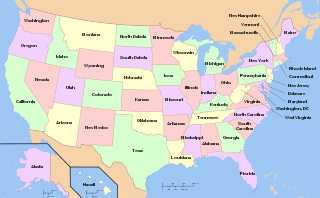In the United States, a Uniform Act is a proposed state law drafted by the Uniform Law Commission (ULC) and approved by its sponsor, the National Conference of Commissioners on Uniform State Laws (NCCUSL).

The United States of America (USA), commonly known as the United States or America, is a country comprising 50 states, a federal district, five major self-governing territories, and various possessions. At 3.8 million square miles, the United States is the world's third or fourth largest country by total area and is slightly smaller than the entire continent of Europe's 3.9 million square miles. With a population of over 327 million people, the U.S. is the third most populous country. The capital is Washington, D.C., and the largest city by population is New York City. Forty-eight states and the capital's federal district are contiguous in North America between Canada and Mexico. The State of Alaska is in the northwest corner of North America, bordered by Canada to the east and across the Bering Strait from Russia to the west. The State of Hawaii is an archipelago in the mid-Pacific Ocean. The U.S. territories are scattered about the Pacific Ocean and the Caribbean Sea, stretching across nine official time zones. The extremely diverse geography, climate, and wildlife of the United States make it one of the world's 17 megadiverse countries.
In the United States, state law refers to the law of each separate U.S. state.

The Uniform Law Commission is a non-profit, American unincorporated association. Established in 1892, the ULC aims to provide U.S. states with well-researched and drafted legislation to bring clarity and stability to critical areas of statutory law across jurisdictions. The ULC promotes enactment of uniform acts in areas of state law where uniformity is desirable and practical. The ULC headquarters are in Chicago, Illinois.
Contents
Federalism in the United States traditionally limits the legislative authority of the federal government in favor of the states. Specifically, the Tenth Amendment of the United States Constitution states that "powers not delegated to the United States by the Constitution, nor prohibited by it to the States, are reserved to the States respectively, or to the people". [1] Therefore, state governments are free to enact unique laws in any area beyond the purview of federal preemption. Under the doctrine of Erie Railroad Co. v. Tompkins (1938), federal courts cannot dictate law to states on pure issues of state common law (almost all of contract, tort, and family law). However, a variety of legal issues regularly transcend state lines, which makes a predictable and relatively uniform set of laws across states a desirable objective. "Uniform Acts" are collaboratively written model laws intended to facilitate the enactment of identical or similar laws by the separate states. Such laws are distinct from interstate compacts.

Federalism in the United States, also referred to as the doctrine of shared sovereignty, is the constitutional division of power between U.S. state governments and the federal government of the United States. Since the founding of the country, and particularly with the end of the American Civil War, power shifted away from the states and towards the national government. The progression of federalism includes dual, state-centered, and new federalism.

The Federal Government of the United States is the national government of the United States, a federal republic in North America, composed of 50 states, a federal district, five major self-governing territories, and several island possessions. The federal government is composed of three distinct branches: legislative, executive, and judicial, whose powers are vested by the U.S. Constitution in the Congress, the President, and the federal courts, respectively. The powers and duties of these branches are further defined by acts of congress, including the creation of executive departments and courts inferior to the Supreme Court.

In the United States, a state is a constituent political entity, of which there are currently 50. Bound together in a political union, each state holds governmental jurisdiction over a separate and defined geographic territory and shares its sovereignty with the federal government. Due to this shared sovereignty, Americans are citizens both of the federal republic and of the state in which they reside. State citizenship and residency are flexible, and no government approval is required to move between states, except for persons restricted by certain types of court orders. Four states use the term commonwealth rather than state in their full official names.






